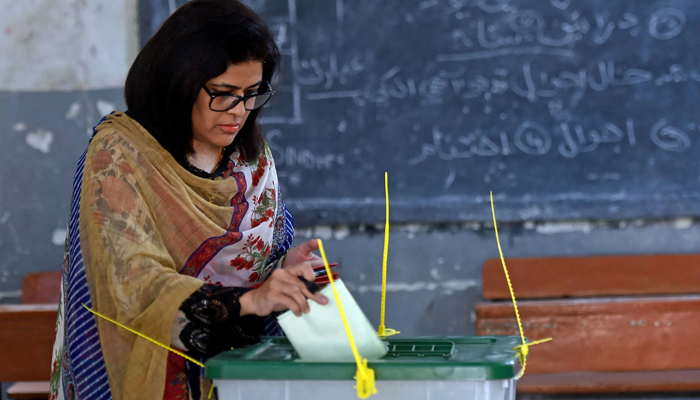After the election
Here’s pre-election scene 1: The government of Pakistan has undertaken some critical reforms including rationalization of gas prices, rationalization of electricity subsidies and lowering of trade tariffs.
Here’s pre-election scene 2: Saudi Aramco has invested $100 million and acquired a 40 per cent share in Gas and Oil Pakistan Ltd. Etisalat is making a substantial investment of $490 million to secure full ownership of Telenor Pakistan (Pvt) Limited. Shanghai Electric Group Company Limited has achieved a successful financial closing of $2 billion for Pakistan’s largest Thar coal-fired power project. Wafi Energy is investing some $200 million to acquire a majority stake in Shell Pakistan Limited. Shell Pakistan has 782 petrol pumps, 10 fuel terminals and a lubricant oil blending plant. Additionally, Islamabad and Riyadh have now agreed on a legal framework for multi-billion dollar Saudi investment.
Here’s pre-election scene 3: The World Bank is lending $350 million under Resilient Institutions for Sustainable Economy (RISE II). The International Development Association (IDA) is matching the World Bank’s $350 million. The Asian Development Bank (ADB) is lending $250 million to help Pakistan improve power transmission. The number of active taxpayers has now reached 5.3 million.
Here’s pre-election scene 4: The World Bank has expressed serious concerns that after the forthcoming elections, ‘powerful and organized vested interests’ could lead to several possible rollbacks in ‘crucial policy reforms’.
Here’s pre-election scene 5: The World Bank has identified six potential risks: One, high macroeconomic risks. Two, stakeholder risks. Three, political and governance risks. Four, macroeconomic risks. Five, implementation and sustainability risk. Six, risks to fiscal and debt sustainability.
Here’s pre-election scene 6: From political parties to courts, our institutions are polarized. Yes, the masses echo this polarization. Leaders are divided; no one is interested in a dialogue or finding common ground. Social media is fueling the flames of discord, fracturing public opinion as state institutions stand paralyzed.
Here’s pre-election scene 7: None of the prominent political parties has offered, presented or articulated a plan or a strategic framework to address economic challenges, political instability, security concerns, energy crisis, climate change, corruption or educational disparities.
Post-election warning: This absence of a strategic framework will leave Pakistan vulnerable to further setbacks.
Post-election question 1: Are we going to elect leaders who will step up, bridge the divides and chart a path forward for a united Pakistan?
Post-election question 2: Are we going to elect leaders who will break the cycle of polarization and find the common ground that binds us together?
Post-election question 3: Are we going to elect a government that will give preference to economics over politics?
Post-election question 4: In this election, will we get leaders who put economic stability and job creation at the top of their agenda, or will the zero-sum political gamesmanship continue to hold sway?
Post-election question 5: Can this election transcend divisive politics and deliver leaders who prioritize Pakistan’s prosperity over their own power? Will the chosen leaders be the architects of a united, flourishing Pakistan?
Make no mistake, the Pakistani spirit remains strong. We have the potential to rise above petty differences and rebuild a Pakistan where unity thrives.
The writer is a columnist based in Islamabad. He tweets/posts @saleemfarrukh and can be reached at: farrukh15@hotmail.com
-
 Netflix, Paramount Shares Surge Following Resolution Of Warner Bros Bidding War
Netflix, Paramount Shares Surge Following Resolution Of Warner Bros Bidding War -
 Bling Empire's Most Beloved Couple Parts Ways Months After Announcing Engagement
Bling Empire's Most Beloved Couple Parts Ways Months After Announcing Engagement -
 China-Canada Trade Breakthrough: Beijing Eases Agriculture Tariffs After Mark Carney Visit
China-Canada Trade Breakthrough: Beijing Eases Agriculture Tariffs After Mark Carney Visit -
 London To Host OpenAI’s Biggest International AI Research Hub
London To Host OpenAI’s Biggest International AI Research Hub -
 Elon Musk Slams Anthropic As ‘hater Of Western Civilization’ Over Pentagon AI Military Snub
Elon Musk Slams Anthropic As ‘hater Of Western Civilization’ Over Pentagon AI Military Snub -
 Walmart Chief Warns US Risks Falling Behind China In AI Training
Walmart Chief Warns US Risks Falling Behind China In AI Training -
 Wyatt Russell's Surprising Relationship With Kurt Russell Comes To Light
Wyatt Russell's Surprising Relationship With Kurt Russell Comes To Light -
 Elon Musk’s XAI Co-founder Toby Pohlen Steps Down After Three Years Amid IPO Push
Elon Musk’s XAI Co-founder Toby Pohlen Steps Down After Three Years Amid IPO Push -
 Is Human Mission To Mars Possible In 10 Years? Jared Isaacman Breaks It Down
Is Human Mission To Mars Possible In 10 Years? Jared Isaacman Breaks It Down -
 ‘Stranger Things’ Star Gaten Matarazzo Reveals How Cleidocranial Dysplasia Affected His Career
‘Stranger Things’ Star Gaten Matarazzo Reveals How Cleidocranial Dysplasia Affected His Career -
 Google, OpenAI Employees Call For Military AI Restrictions As Anthropic Rejects Pentagon Offer
Google, OpenAI Employees Call For Military AI Restrictions As Anthropic Rejects Pentagon Offer -
 Peter Frampton Details 'life-changing- Battle With Inclusion Body Myositis
Peter Frampton Details 'life-changing- Battle With Inclusion Body Myositis -
 Waymo And Tesla Cars Rely On Remote Human Operators, Not Just AI
Waymo And Tesla Cars Rely On Remote Human Operators, Not Just AI -
 AI And Nuclear War: 95 Percent Of Simulated Scenarios End In Escalation, Study Finds
AI And Nuclear War: 95 Percent Of Simulated Scenarios End In Escalation, Study Finds -
 David Hockney’s First English Landscape Painting Heads To Sotheby’s Auction; First Sale In Nearly 30 Years
David Hockney’s First English Landscape Painting Heads To Sotheby’s Auction; First Sale In Nearly 30 Years -
 How Does Sia Manage 'invisible Pain' From Ehlers-Danlos Syndrome
How Does Sia Manage 'invisible Pain' From Ehlers-Danlos Syndrome




